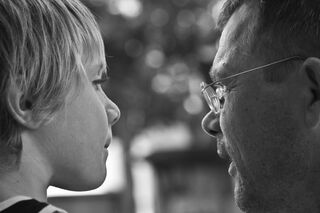Coronavirus Disease 2019
Helping Child Abuse Victims During COVID-19
Practical advice to keep children safe from abuse during COVID-19.
Posted May 23, 2020
What do the Great Recession and Hurricane Katrina have in common? Increased child abuse rates. We have learned that during crisis, children are especially vulnerable to abuse, and history is repeating itself during the COVID-19 pandemic. When parents are severely stressed, even those parents who have exceptional parenting skills, our children suffer.
Shelter-in-place orders across the U.S. have kept children from being in environments with mandatory reporters. Many of the resources parents rely on such as grandparents, day care, schools, and extracurricular activities are no longer available in many areas. And now, many children are stuck at home with their abusers with little to no relief, or hope.
Because of COVID-19, we all must be mandatory reporters. If we suspect a child in our community is at-risk for abuse or is being abused, we must take action despite our own fear or discomfort.
What if I am wrong? A common question. Should I report or not report? A common misstep. When there is reasonable suspicion of child sexual abuse, you must report your suspicions to the police or child protective services or both. But why do many adults fail to act—fail to do what is in the best interest of a child? State laws only require us to have ‘reasonable suspicion,” which means that you do not need "proof" that abuse is occurring to report. Reasonable suspicion could mean you have witnessed physical or behavioral signs of maltreatment, either in a child or a parent, or both, or a child has told you, disclosed, that they are being abused.
Making a good faith report—acting in the best interest of the child—is the only way we can help victims receive treatment sooner. The promises for a better recovery from the trauma start with intervening immediately.
When a child tells you that they are being abused, they need—at minimal—these five things from you:
1. Patience. We need time and patience. The story may not come out all at once—it may take hours, days, weeks, months, years. We are processing the trauma as we tell. We are grieving as we tell. We are angry as we tell. We are hearing the words come from our mouths for the first time—and we are afraid of being judged, shamed, silenced, not believed. Do not ask us questions about the abuse. Let us tell you when we are ready.

2. Listen with composure. What do we mean by composure? We mean sit comfortably, refrain from making comments with your expressions such as widening your eyes, covering your mouth with your hands—just listen. Ask us if you can hold our hand, or put your hand on our shoulder. Ask us open-ended questions like “then what happened?”
3. Keep our space private and quiet. Ask if we are comfortable. Do we need a glass of water? tea? Are we hot? cold? Ask us if we feel safe? If not, where would we feel safer?
4. Offer compassion, not pity. Offer support, not drama. Tell us you believe us. Tell us you will get us help. Tell us we are not alone. Tell us you care.
5. Keep our story confidential until it is safe for you to report it to authorities. Don’t tell anyone else without asking us first. Ask us, "May I share what you told me with___?" Say something like, “I will get us the help we need.”
When you do make a good faith report to authorities about child sexual abuse, it is helpful to have the following information ready:
- Name and age of child
- Where the child lives
- Where the offender lives
- Types of abuse you are suspicious of
- When you report a known case of child sexual abuse, it is helpful to have the following information ready:
- Date, time, and location the child told you about the abuse
- Dates and times you suspected abuse, if there were any
- The name of the perpetrator and if they are aware that the child told you
- The name of the non-offending parents, if they are non-offenders
And finally, safety first when reporting child sexual abuse. Don’t contact any household members that live with the child. This could put you and the child’s safety at risk. Remember 90% of child sexual abuse happens with people know to the family or a family member. It is broken down like this: 30% of children are abused by family members and as many as 60% are abused by a person the family knows and trusts.
If you or a loved one needs help for a domestic abuse situation, consider these resources:
- National Domestic Hotline, 800-799-7233
- Crisis Text Line, text HOME to 741741




